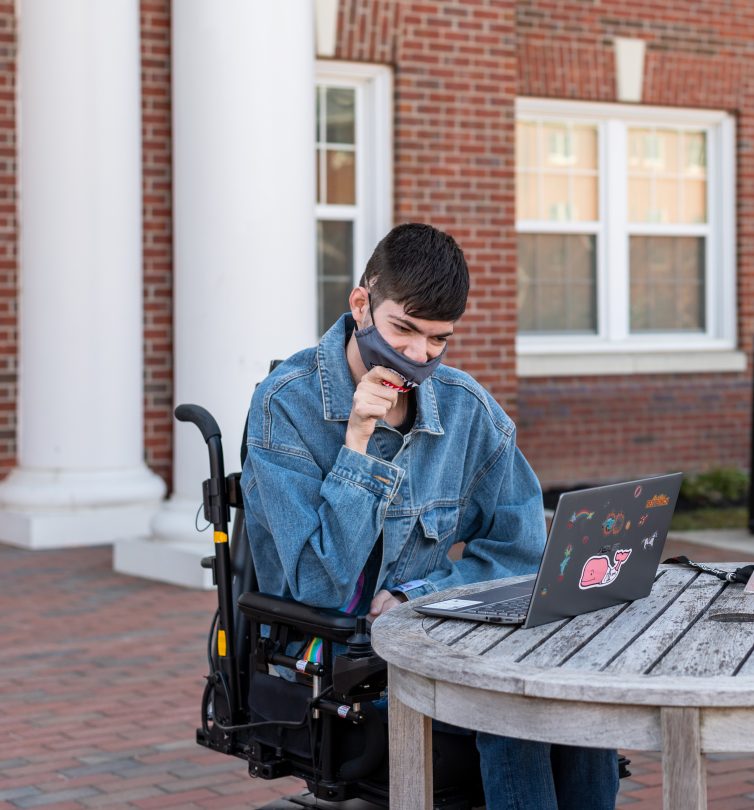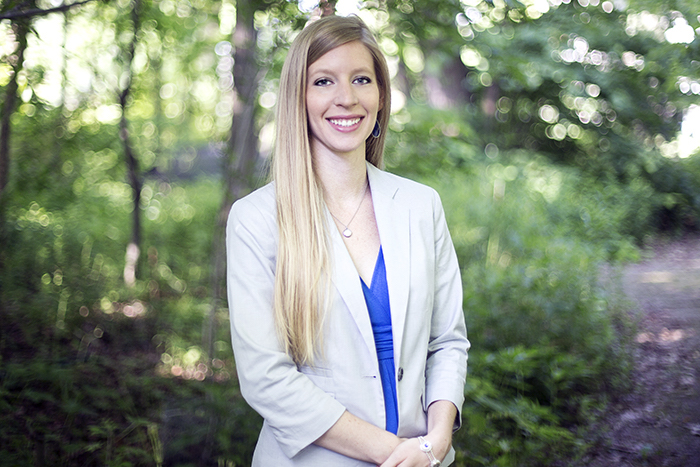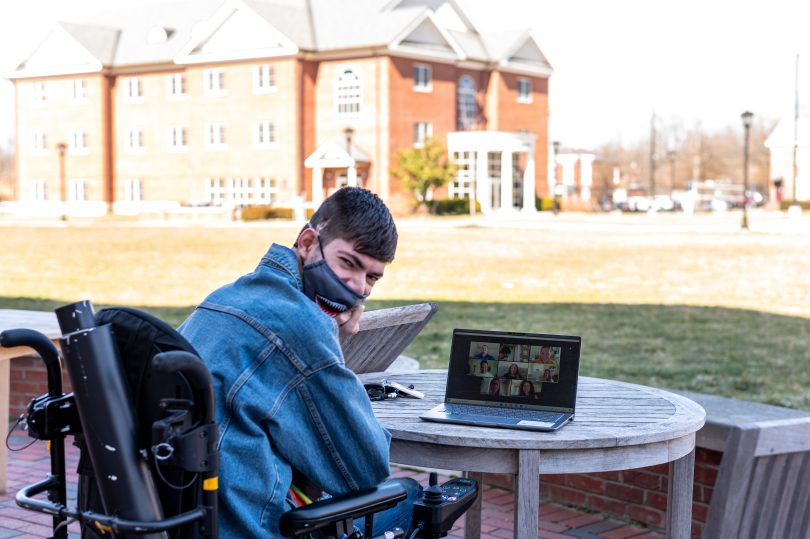
When psychology major Nathan French ’21 makes his way across Transylvania University’s campus, he does so by wheelchair. He is one of 61 million adults in the U.S. who daily navigate a range of barriers specific to their diverse situations, according to the Center for Disease Control. A passionate advocate for people with disabilities, French brings a unique perspective to life on and off Transy’s campus, building awareness wherever he goes. It’s a reciprocal kind of learning; as he grows, so do the people and institutions around him.
French came to Transylvania from Louisville, Kentucky, because he loved the environment. “It was very open to new ideas and everybody was friendly,” he says. “Also, it was very accessible for me, being near the hospital and any medical needs I might have.” At Transy, French explored biology and neuroscience before discovering with elation how well the field of psychology would serve his life’s purpose.
“By utilizing psychology I can benefit myself and the disability community the most,” he says, describing how indispensable psychology is to his ability to communicate effectively, to bridge the gap between the disability community and the wider world. He knows that developing consciousness and understanding among the latter is key to achieving his ultimate goal: “the equity of everybody, no matter their disability.”
But even successful student advocates require formal, professional opportunities to augment their daily academic and social experiences. Through his Transy community, French gained the connections and hands-on practice necessary to progress toward his goal. At each step, members of the community were glad to learn from him as well as to offer their help.
In Sharon Brown’s Health and Wellness class, for example, French found a professor of health and exercise science intent on making her class, usually focused on the preferences of the able bodied, become more inclusive and interesting for him. As she rethought her class from French’s perspective, her approach to the class broadened, as did her overall awareness.
“This really has been an amazing experience for me,” says Brown, reflecting on her shifting perspective and how differently she now looks at health and wellness as well as the physical campus. “I talk a lot about the built environment — biking trails, safe walking places — but I’d never talked about it in terms of inclusivity. From now on that will be part of my conversation in class.”
Replacing her “lens of able-bodiedness,” Brown knew that she could use some help devising beneficial class assignments for French, particularly during the restrictive period of the coronavirus. So she tapped her former student Lindsey Powell Mullis ’06 “as somebody who has experience and expertise in promoting wellness with people with disabilities.” Mullis is now the program director for the Kentucky Inclusive Health Collaborative of the University of Kentucky Human Development Institute. Read more about Mullis.
Brown organized a Zoom call for the three of them, and Mullis and French found they shared an interest in the holistic view of health and wellness, particularly as it relates to the world of disabilities. Mullis had made the connection between mind and body and wellness as an undergraduate at Transy when she took an exercise science class with coach Don Lane. She says she promptly added exercise science as a second major to psychology.

Learning about French and how his interests aligned with much of the work she was leading at HDI, Mullis invited him to intern (remotely during the pandemic) and gain practical experience with her. French was excited to accept and immediately became active in several projects. Appreciative of the value and depth he brought to the team, Mullis called it a serendipitous opportunity.
“What is special about what Nathan brings to the table,” Mullis explains, “is his unique lived experience with how he’s experienced disability and his life. That’s a really important voice to have in all of our projects.”
She points to a project for foster parents in Kentucky who live with children with complex medical needs. “He’s been a critical part of the planning process for the content and for the development of the training,” Mullis says. French was able to share lessons he’d learned as someone growing up with a medically complex condition, educating community members to respect the independent agency of the person in their care as well as providing the tools and resources for broader health and wellness that goes beyond their medical condition.
“I’m very grateful the internship has allowed me to be trusted by the team,” French says, “and to do these huge projects.”
Together, Brown and French devised an outdoor assignment that had French assess his mobility on campus and write a report on difficult areas. Brown connected French with Deidra Dennie, Transy’s vice president for diversity and inclusion, to discuss a possible campus survey that could help improve accessibility. It so happened that his intention coincided perfectly with hers. And through his internship with Mullis, he had access to a professional accessibility audit.
“So, this angel Nathan dropped into our project,” Dennie says, describing her good fortune, “and came ready made with an accessibility audit.” Because of the limitations during COVID-19, the survey had to be pared down, but that became part of the learning process. More importantly, French was able to engage his peers in observing the campus from a new perspective.
Students who had been unaware of mobility issues on campus took part by visiting and assessing locations as they answered questions in the survey. Did the transit stop have a bench? Was it located on a stable surface? Is there a bathroom drain in the stall that prohibits access?
The data provided good information, Dennie says, extolling the value of having a student leading the charge. “When it’s their peer,” she says, “ I think you get richer data, richer information.” It can lead to a more welcoming and accessible campus that will better serve the 1-in-3 people in Kentucky who have a disability.

With French’s help, Dennie notes, “Students are learning about and living with difference every day. They aren’t just leaning in — they’re lifting up others as fully valuable members of the world.” The growth is beneficial to everyone.
“For Nathan, it was a learning experience,” Dennie says. “He gained some things out of it. But Transy gets something out of it too,” she adds, “because [we] now know, based on the responses he got, where we need to spend a little time and where we can start building a case for making sure that mobility and learning differences make it to conversations, make it into the perspective of how we design courses or buildings or how we lay out our grounds. Everything.”
As French prepares to graduate from Transylvania, he’s planning his master’s degree in social work at the University of Kentucky, where he hopes to continue to work with Mullis and her team — for the equity of everyone, no matter their disability.
“I love to bring my perspective,” French says, “and I love to help.” He knows that advocacy is where it begins.

